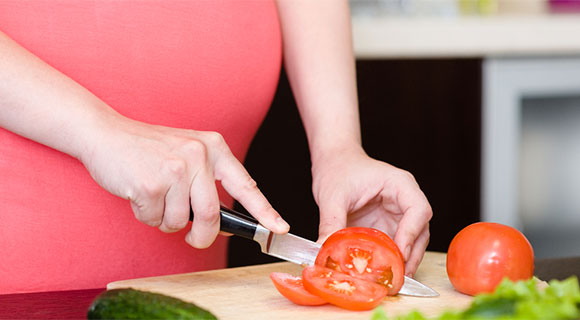
Order for Two! Healthier Eating for Pregnant, Diabetic Women
When you’re pregnant, your food choices can pack double the punch. In fact, maintaining a proper diet during your pregnancy can be one of the most important things you do to keep the tiny tot in your belly healthy, especially if you have diabetes.
Let’s get down to basics
Experiencing cravings as your little bundle grows? Cut yourself some slack (and ignore the sideways glances when things get weird)—it’s normal. Still, you’re going to want to talk to your dietician or doctor about developing a food plan that can help you control your blood sugar, as well as provide your baby with good nutrition.
To help get you started, here are a few bite-sized mommy-to-be tips:
- Eat often: Gotta love this one, right? Try to eat every 2-3 hours, which may mean three main meals with three to four snacks daily. Snack before bedtime, and try not to let 10 hours pass before sitting down for breakfast the following day. Keep carbs spread thinly throughout the day, as opposed to trying to tackle your daily intake all in one go.
- Serving sizes: Be mindful. You can eat enough for your baby to grow without overdoing it. Using measuring cups and spoons can help you pay attention to portions.
- Purchasing packaged foods: Be picky—read all the food labels when purchasing foods that have already been prepared, such as frozen meals or snacks. Only have a moment to spare? Know that ingredients are listed in order of amount. If any of the first four ingredients are sugar, corn syrup, honey fructose, or any word ending in “-ose” (nice little trick, isn’t it?), then that product may have too much sugar for somebody with diabetes. The easiest way to play it safe? Eat fresh food whenever possible.
- Breakfast: Avoid milk, ready-to-eat cereal, and fruit first thing in the morning. Your body may still be in snooze mode, and not yet prepared to handle the sugars found in these foods. Instead, reach for starches that are high in fiber, such as 100 percent whole-wheat toast or an English muffin, corn or wheat tortillas, or oatmeal and a lean protein, such as egg whites or lean ham.
- Carbohydrates: During pregnancy, about 40-45 percent of your daily calorie intake can come from carbohydrates. Those that have earned a “thumbs up” include beans, lentils, veggies, fresh fruits, and whole-grains. Whole-grains such as brown rice, 100 percent whole-wheat bread, whole grain pasta, and oatmeal contain protein, fiber, and many vitamins and minerals that your body needs. Milk and yogurt also count as user-friendly carbohydrates.
- Protein: When you’re pregnant, you’re in need of more protein than usual. Be sure to choose lean proteins such as lean beef, lean pork, skinless chicken, turkey, fish, soy, or non-fat and low-fat dairy options.
- Fats: Choose healthier fats in small amounts, such as nuts, seeds, avocado (this one’s for you, guacamole lovers!), canola oil, and olive oil.
- Calcium needs: Calcium can be crucial to bone health, especially during pregnancy. Load your day up with 3-4 servings of calcium-rich foods. One serving can mean eight ounces, or one cup of non-fat or low-fat milk or calcium-enriched soymilk, six ounces of light yogurt, or 1.5 ounces of reduced-fat cheese. Remember that milk and yogurt can count toward your daily carbohydrate intake, and that if you’re lactose intolerant, a calcium supplement (which packs about 1,000-1,2000 mg) may provide a solid alternative.
- Fast food and restaurant food: Think carefully, ask questions, and then repeat. If you know in advance that the portions are large, ask for a to-go container and fill it halfway before you even start to dig in. Just because ingredients are out of sight doesn’t mean they should be out of mind. Many sauces can contain extra sugar, fats, or starch that you won’t be aware of unless you ask.
- Calories that’ll do nothin’ for ya: Limit sugary desserts and snacks that can have your blood sugar on the rise. Avoid products with saccharin. Artificial sweeteners with aspartame or sucralose are safe in moderation (think 3-4 servings a day).
By committing to healthy eating during pregnancy, you can help keep your blood sugar in a normal range and provide your growing baby with the balanced nutrition he or she needs.





